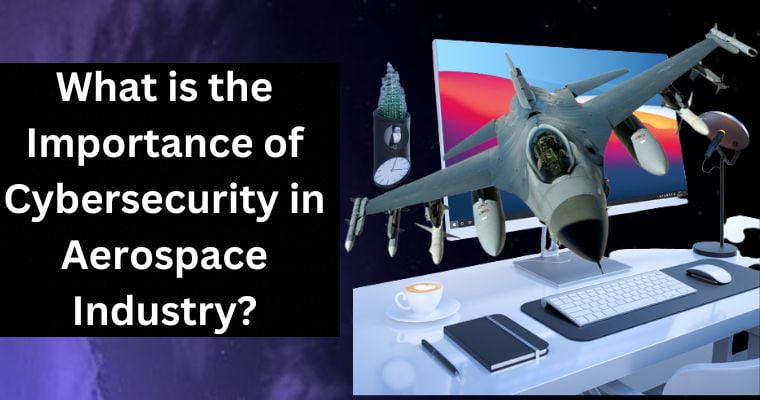Cybersecurity is an essential part of the aerospace industry, & businesses should take steps to defend themselves from possible attacks.
Aerospace Corporation should have a strong cybersecurity infrastructure in place to defend their data & assets from cyber-attacks. Furthermore, they should make sure their workers are aware of the significance of cybersecurity & how to protect themselves.
Cybersecurity is a critical concern for both aviation operators and passengers and is not limited to aircraft.
To protect yourself and your data, you need to be aware of the cybersecurity landscape, have visibility into your operations, and use the right technologies, policies, procedures, and controls.
A long-range aircraft, such as an Airbus or a Boeing, uses countless complicated systems to control a broad range of components, ensuring the security of the aircraft & its traveler.
But, it is not obligatory for cyber hackers to get whole control of an airplane in order to cause severe concern or huge financial loss. Cyber attacks on aircraft systems can cause a variety of problems, including loss of control, ballooning fuel bills, and even fatalities.
Any significant doubt in the pilots’ minds can lead to an early landing at the next airport. This can be caused by any small-scale yet noticeable interference, such as a cyber attack.
To avoid being victimized by cyber-attacks, aircraft manufacturers need to continually make sure their aircraft’s electronic systems are protected with fixed cybersecurity. This means building protection into the microprocessor itself, which acts as a shield against intrusions.
Cyber security services can be vital when designing microelectronics, as it helps shield the devices against possible hackers. Additionally, safe air-to-ground communications are significant to keep networks operating smoothly.
Aerospace companies are presently the major problem to their own survival, as they are not taking proper measures to defend their ground operations and activities.
This is primarily true for smaller companies, who might not be competent to afford the required security measures or hire professionals.
Table of Contents
Implementation and Management of Cybersecurity Measures in the Aerospace Industry
Cybersecurity is a major concern for everybody who always gets in touch with electronic and communication devices such as laptops and PC.
Cybercriminals are frequently coming up with new ways to disrupt our lives, & we need to take steps to shield ourselves. Information security is a vital part of protecting ourselves online, & we need to do our part to help keep our information secure.
As the number of linked devices grows, so does the need for information security. This is especially true for the aviation industry, which is subject to stringent government regulations and scrutiny.
Flying is a very safe way to travel. There have been a few cases where airline booking systems were hacked, but there has never been a verified case where hackers interfered with safety by getting into a committed system.
The safety of our aerospace systems is of the utmost importance, given the increasingly interconnected world we live in. With outpost communications technology, we can keep track of aircraft in flight and the ground operations they’re interacting with, making sure everyone is safe.
Military aviators rely on commanders on the ground and in the air to make informed decisions. Commercial pilots can access synchronized climate information & flight arrangement data to help them get where they’re going.
In-flight Wi-Fi keeps passengers connected to their homes &place of work, and it also notifies ground crews in advance when maintenance is necessary. This system ensures that passengers always have the latest information.
Cybersecurity is necessary for the protection of aviation assets & information from potential hackers. With connectivity growing more significant every day, we need to ensure that our systems are as safe as possible.
The government, aircraft groups, and national & military operators, are all working to keep us safe from hackers. They are trying to make innovative ways to stop & keep away from hacker attacks.
Assessing the Significance of Cybersecurity in the Aviation Industry
The incidence of online threats & cyber violence is on the rise, and it has affected businesses of all sizes around the globe. Cybersecurity threats are not just a financial challenge, but also a risk to the reputation and reliability of a corporation.
There is no safe haven from rivalry in today’s economy, so some business that allows it to be targeted by cyber attack risks losing clientele and money. Airlines are no exemption, with IATA estimating that cyber-attacks cost the worldwide economy around $460 billion a year.
After conducting a risk assessment, different measures are put in place by national authorities to protect vital information and communications technology systems used for federal aviation purposes.
These systems are constantly monitored and updated to ensure that they remain safeguarded.
What are the top cybersecurity challenges for the aviation industry?
Aviation manufacturing faces many cybersecurity problems that need to be addressed in order to keep passengers & aircraft secure. These challenges contain preventing cyber attacks, detecting and responding to them rapidly, and protecting data & systems from cyber attacks.
Moreover, the aviation industry needs to develop better safety protocols and training for employees so that they are better prepared to protect the networks & data of the airlines.
- Compliance testing is significant to make sure that all the systems are safe & protected from illicit access or attack.
- The aviation industry should test its critical systems to make sure they are functioning correctly by using cybersecurity professionals from outside the industry & by conducting tests separately.
- Companies that work in the aviation industry need to be conscious of cybersecurity & train their employees to be proactive about it. Certification from aviation authorities helps to endorse this culture.
- A corporation that manufactures airplanes must have a group of people who can find & fix security vulnerabilities in time.
- To keep your aviation firm protected, you need to make sure your cybersecurity policies are strong.
- The aviation business depends on a complex infrastructure that is included in numerous systems. These systems need to be separately & holistically confined.
A comprehensive cyber assessment is necessary involving aircraft &tools manufacturers, air-traffic control, airports, airlines, & all the other elements of the aviation infrastructure. This assessment should include a review of the information systems used by these entities.
Security testing is an important part of protecting your business from cyber threats. It can include penetration testing, where cyber experts try to gain access to systems, and vulnerability testing, which looks for flaws in security.
What makes a System Vulnerable?
Vulnerability is needed to exploit a system. It is possible that the vulnerability was not identified until after an attack was already underway. Therefore, it is important to regularly patch vulnerabilities in order to keep systems safe from attack.
Another essential factor to consider when protecting your company’s data is the insider threat. Reports show that this type of threat is on the rise, so employees need to be well-informed about how to protect themselves and adhere to cybersecurity policies and best practices.
Processes and playbooks should be regularly reviewed and tested to ensure continued improvement. This should be done in addition to establishing strict access controls to only allow those who need clearance to areas where necessary.
What Measures are airlines Taking to Prevent Cyber Threats?
- To protect against cyber threats, the board of directors should play a significant role.
- The airlines must make it a priority to provide training and responsiveness about cyber threats and crimes to their workers, and they must do this frequently throughout the organization. This must be a topic of conversation in meetings, presentations, and throughout assigning work.
- The airlines should talk about & socialize business standards so that everyone is working towards a similar objective. This will help make sure a high standard of service for everybody.
- A great panel of cybersecurity experts is necessary for every airline company. This team must be well-trained & equipped to identify and prevent any nasty activity.
- Airline firms must invest in strong cybersecurity goods to protect themselves from cyber-attacks. This is especially significant as more & more companies are becoming online businesses.
Conclusion
Cybersecurity is a major concern for the aviation industry, as a sensitive risk means that attacks could have a noteworthy impact on passenger security and airline operations.
Airlines & airports need to develop an all-inclusive strategy to address cyber threats, as this is an area where perfection is required. The stakeholders must continue to build on the progress that has been made therefore far in order to strengthen the mandate of cybersecurity.
Professionals and agencies have made numerous key recommendations that must be considered in order to improve the efficiency of cybersecurity efforts.



